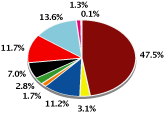| |
August 6, 2004
ACNIS Releases Public and Expert Opinion Results on
Armenia's National and International Security
Yerevan-The Armenian Center for National and International Studies (ACNIS) today issued the results of both a specialized questionnaire and a public survey on "Armenia's National and International Security in the Next Decade," which it conducted between July 15 and August 2 in Yerevan and all of Armenia’s regions. More than 50 experts and 2021 citizens took part in them. Do Armenian citizens trust the reliability of their country’s national security? What are the major military, political, economic, and social dangers that will threaten Armenia in the next 5 years and to what extent do state authority bodies take the necessary steps to prevent, abolish, or control these dangers?
ACNIS director of administration Karapet Kalenchian greeted the invited guests and public participants with opening remarks. "These deliberations on national security, together with the public and expert survey preceding them, aim to present public and professional perceptions of national security problems and draw the attention of responsible bodies to them," he said.
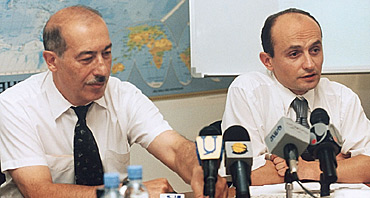
ACNIS legal and political affairs analyst Stepan Safarian presented "The Results of the Survey," focusing in detail on the findings of the expert and public opinion polls. According to the findings, the majority of the surveyed citizens (45.1%) assert that Armenia’s national security is partially provided, 27.5% think it is not provided at all, 18.1% feel secure enough, and 9.1% find it difficult to answer. In the expert opinion poll, these indices read 24%, 76%, 0%, and 0%, respectively.
27.2% of citizens think that Armenia should first of all strengthen its army’s combat-readiness in the next 5 years, 43.5% its economic potential, and 26.8% its democratic potential. As for the expert survey, 58% hold that democratic potential should be strengthened first of all, 24% economic potential and only 10% army’s combat-readiness.
Among the broader public, 3.1% point to the presence of Russian military bases in Armenia as the major military danger that will threaten Armenia in the next 5 years, 11.2% the withdrawal of these bases from Armenia, 47.5% the outbreak of war with Azerbaijan, 2.8% Armenia’s accession to NATO, 7% Turkey’s military invasion of Armenia, 11.7% civil war, 1.7% possible military conflict with Georgia. Only 13.6% think there is no military danger.
| Outbreak of war with Azerbaijan
|
47.5%
|
|
Presence of Russian military bases in Armenia
|
3.1%
|
| Withdrawal of Russian military bases from Armenia |
11.2%
|
| Possible military conflict with Georgia |
1.7%
|
| Armenia’s accession to NATO |
2.8%
|
|
Turkey’s military invasion of Armenia |
7.0%
|
| There is no military danger |
13.6%
|
- Difficult to answer
- Preoccupation with formalities
- Territorial redistribution
- Another "October 27"
- Danger of nuclear power plant
- Gangster wars
|
|
|
In the expert opinion poll the corresponding findings are 18%, 4%, 44%, 2%, 8%, 4%, 2%, and 18%.
|
Outbreak of war with Azerbaijan
|
44%
|
|
Presence of Russian military bases in Armenia
|
18%
|
| Withdrawal of Russian military bases from Armenia |
4%
|
| Possible military conflict with Georgia |
2%
|
|
Armenia’s accession to NATO
|
2%
|
|
Turkey’s military invasion of Armenia
|
8%
|
| There is no military danger |
18%
|
|

|
As for the major political danger that will threaten Armenia in the next 5 years, 21.8% of respondent citizens point to confrontations between authorities and people, while 30% of experts point to falsification of election results. Furthermore, 4% of citizens and 24% of experts find danger in the restriction of Armenia’s sovereignty, 9.8% and 14% in the limitation of political and civil rights, 11.6% and 0% in a possible attempt of revolt, 6.5 and 6% in political terrorism, 14.2% and 0% in provocation of political tension by the opposition, and 2.9% and 10% in Armenia’s absence from regional programs. Only 6.8% and 0% are convinced there is no political danger.
| Confrontations between authorities and people
|
21.8%
|
|
Possible attempt of revolt
|
11.6%
|
| Limitation of political and civil rights |
9.8%
|
| Provocation of political tension by the opposition |
14.2%
|
|
Falsification of election results |
20.7%
|
| Armenia’s absence from regional programs |
2.9%
|
| Restriction of Armenia’s sovereignty |
4.0%
|
| There is no political danger |
6.8%
|
- Difficult to answer
- Disagreement among politicians and parties, power struggles
- Confrontations between opposition and authorities
- The lack of transfer of power, degeneration of authorities
- National disunity
- 4th, 6th and 7th, 6th-8th, 1st-8th options
|
|
|
|
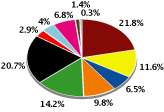
|
| Confrontations between authorities and people
|
10%
|
|
Possible attempt of revolt
|
0%
|
| Limitation of political and civil rights |
14%
|
| Provocation of political tension by the opposition |
0%
|
|
Falsification of election results |
30%
|
| Armenia’s absence from regional programs |
10%
|
| Restriction of Armenia’s sovereignty |
24%
|
| There is no political danger |
0%
|
- Delay in surmounting the present crisis of national-state ideology
- Unfair elections and marionette authorities
|
|
|
|
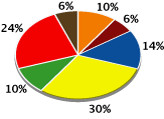
|
Both groups of respondents find corruption to be the major economic danger that will threaten Armenia in the next 5 years (41% and 42%). 11.2% and 12% think it is foreign debt, 19.8% and 14% financial economic crisis, 5.5% and 10% the maintenance of Azerbaijan’s and Turkey’s economic blockade on Armenia, and 11.6% and 8% plunder of foreign loans provided for the state. 22.8% of citizens and 12% of experts cite emigration to be the major social danger, 19.3% and 6% poverty, 23.8% and 0% unemployment, 13.4% and 34% illegality, 8.9% and 30% immorality, and 2.2% and 12% reduction of birth rate. 1.4% and 0% of respondent citizens and experts, respectively, suggest that there is no social danger.
| Economic, financial crisis |
19.8%
|
| The maintenance of Azerbaijan’s and Turkey’s economic blockade
of Armenia |
5.5%
|
| Armenian enterprises of strategic importance belonging to foreign companies (ArmenTel, Zvartnots airport, energy distribution networks, Nairit, etc.) |
7.1%
|
|
Plunder of foreign loans provided to the state |
11.6%
|
| There is no economic danger |
2.4%
|
- Difficult to answer
- Natural disasters
- 2th and 6th, 1st, 5th and 6th-8th, 1st-6th options
|
|
|
|
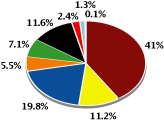
|
| Economic, financial crisis |
14%
|
| The maintenance of Azerbaijan’s and Turkey’s economic blockade
of Armenia |
10%
|
| Armenian enterprises of strategic importance belonging to foreign companies (ArmenTel, Zvartnots airport, energy distribution networks, Nairit, etc.) |
6%
|
|
Plunder of foreign loans provided to the state |
8%
|
| There is no economic danger |
2%
|
- All of the above: continuous deepening of systemic crisis
- Circumvention of democracy and market economy
- Application of economic methods of territorial supervision by power centers (especially the United States)
|
|
|
|
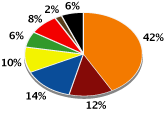
|
In response to the question, "To what extent do state authority bodies take the necessary steps to prevent, abolish, or control these dangers?," 2.6% of citizens and 0% of experts think fully, 41.2% and 12% partially, 48.8% and 88% not at all, and 6.9% and 0% find it difficult to answer. The majority of citizens (76.9%) think that from the viewpoint of security, Armenia’s relations should be developed with Russia, whereas experts (88%) choose the European Union. As for the United States, the figures are 35.6% and 76%, for Iran 31.9% and 48%, and for Turkey 16% and 64%. 49% of respondent citizens and 52% of specialists think that Armenia, Azerbaijan, and Georgia should be in a united system of security, 26.2% and 30% think they should not, and 23.9% and 18% find it difficult to answer. 42.8% of citizens and 64% of experts have positive attitudes toward opening the Armenian-Turkish border, 34.8% and 24% have negative attitudes, and 21.3% and 12% find it difficult to answer.
In regards to foreign military presence, 46.9% of citizens are convinced that only Russian military bases should be in Armenia in the next decade, while 40% of respondent specialists think Russian and NATO military bases should. In contrast, 20.8% and 0% think military bases of Russia and CIS member-states should be in Armenia, and 2.5% and 12% only NATO military bases together. 13.2% of citizens and 30% of experts are for the withdrawal of all foreign military bases from Armenia.
The second item on the day’s agenda was a presentation by Stepan Safarian,
who addressed the causes of the sometimes differing, sometimes
similar polling numbers of the experts and the citizens.
"We may deduce from the results that citizens are more
interested in and affected by internal issues, while experts
are more concerned with external problems," he emphasized.
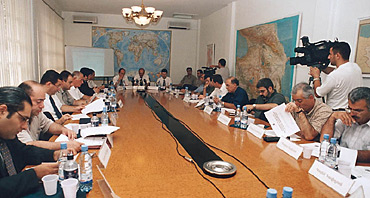
The formal presentations were followed by contributions by former minister of state Vahan Shirkhanian; Edward Antinian of the Liberal Progressive Party; Asbed Kotchikian, post-graduate student from Boston University; Vahagn Khachatrian of the "Armat" center; Giro Manoyan of the Armenian Revolutionary Federation; Yerevan State University professors Vardan Khachatrian and Aram Harutiunian; Artashes Ghazakhetsian of Armenia 2020 program; Petros Makeyan of the Democratic Fatherland Party; Tevan Poghosian of the International Center for Human Development; ACNIS economic and diaspora affairs analyst Hovsep Khurshudian; Artak Zakarian of the Republican Party; National Press Club chairperson Narine Mkrtchian; Davit Petrosian, political analyst for Noyan Tapan news agency; and several others.
44.5% of the respondent citizens are male and 55.5% female; 7% are 18-20 years of age, 24.1% 21-30, 22.7% 31-40, 21.9% 41-50, 12.7% 51-60, 11.6% 61 or above. 42.2% of the citizens surveyed have received a higher education, 8.6% incomplete higher, 20.9% specialized secondary, 24.6% secondary, and 3.7% incomplete secondary training. 46.1% are actively employed, 9.5% are pensioners, 1.4% welfare recipients, and 6.6 students. According to their income, 44% consider themselves middle class, 32.1% below average, 7.6% above average, 11.1% poor, 2.6% extremely poor, 0.5% rich, and 1.2% well-off.
Among the experts, 74% are male and 26% female; 16% are 21-30 years of age, 36% 31-40, 30% 41-50, 18% 51 or above. All the experts surveyed have received a higher education, 4% are full professors (PhD), 24% candidates of sciences, 68% hold a Master’s degree, and 4% have earned a
Bachelor’s degree.
Founded in 1994 by Armenia’s first
Minister of Foreign Affairs Raffi K. Hovannisian, and supported
by the Lincy Foundation and a global network of contributors,
ACNIS serves as a link between innovative scholarship and the public
policy challenges facing Armenia and the Armenian people in the post-Soviet
world. It also aspires to be a catalyst for creative,
strategic thinking and a wider understanding of the new
global environment. In 2004, the Center focuses primarily on public
outreach, civic education, and applied research on critical domestic
and foreign policy issues for the state and the nation.
For further information on the Center and its activities,
call (37410) 52-87-80 or 27-48-18; fax (37410)
52-48-46; e-mail root@acnis.am or info@acnis.am
|
|




